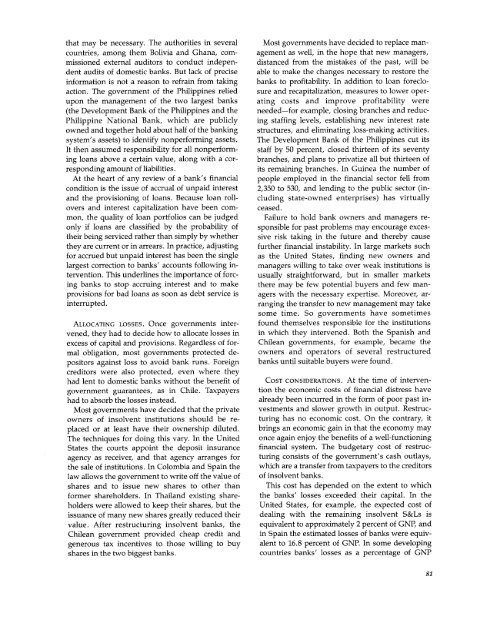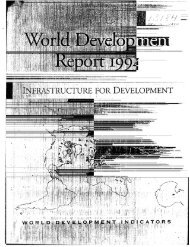Financial systems and development
Financial systems and development
Financial systems and development
You also want an ePaper? Increase the reach of your titles
YUMPU automatically turns print PDFs into web optimized ePapers that Google loves.
that may be necessary. The authorities in several Most governments have decided to replace mancountries,<br />
among them Bolivia <strong>and</strong> Ghana, com- agement as well, in the hope that new managers,<br />
missioned external auditors to conduct indepen- distanced from the mistakes of the past, will be<br />
dent audits of domestic banks. But lack of precise able to make the changes necessary to restore the<br />
information is not a reason to refrain from taking banks to profitability. In addition to loan forecloaction.<br />
The government of the Philippines relied sure <strong>and</strong> recapitalization, measures to lower operupon<br />
the management of the two largest banks ating costs <strong>and</strong> improve profitability were<br />
(the Development Bank of the Philippines <strong>and</strong> the needed-for example, closing branches <strong>and</strong> reduc-<br />
Philippine National Bank, which are publicly ing staffing levels, establishing new interest rate<br />
owned <strong>and</strong> together hold about half of the banking structures, <strong>and</strong> eliminating loss-making activities.<br />
system's assets) to identify nonperforming assets. The Development Bank of the Philippines cut its<br />
It then assumed responsibility for all nonperform- staff by 50 percent, closed thirteen of its seventy<br />
ing loans above a certain value, along with a cor- branches, <strong>and</strong> plans to privatize all but thirteen of<br />
responding amount of liabilities.<br />
its remaining branches. In Guinea the number of<br />
At the heart of any review of a bank's financial people employed in the financial sector fell from<br />
condition is the issue of accrual of unpaid interest 2,350 to 530, <strong>and</strong> lending to the public sector (in<strong>and</strong><br />
the provisioning of loans. Because loan roll- cluding state-owned enterprises) has virtually<br />
overs <strong>and</strong> interest capitalization have been com- ceased.<br />
mon, the quality of loan portfolios can be judged Failure to hold bank owners <strong>and</strong> managers reonly<br />
if loans are classified by the probability of sponsible for past problems may encourage excestheir<br />
being serviced rather than simply by whether sive risk taking in the future <strong>and</strong> thereby cause<br />
they are current or in arrears. In practice, adjusting further financial instability. In large markets such<br />
for accrued but unpaid interest has been the single as the United States, finding new owners <strong>and</strong><br />
largest correction to banks' accounts following in- managers willing to take over weak institutions is<br />
tervention. This underlines the importance of forc- usually straightforward, but in smaller markets<br />
ing banks to stop accruing interest <strong>and</strong> to make there may be few potential buyers <strong>and</strong> few manprovisions<br />
for bad loans as soon as debt service is agers with the necessary expertise. Moreover, arinterrupted.<br />
ranging the transfer to new management may take<br />
some time. So governments have sometimes<br />
ALLOCATING LOSSES. Once governments inter- found themselves responsible for the institutions<br />
vened, they had to decide how to allocate losses in in which they intervened. Both the Spanish <strong>and</strong><br />
excess of capital <strong>and</strong> provisions. Regardless of for- Chilean governments, for example, became the<br />
mal obligation, most governments protected de- owners <strong>and</strong> operators of several restructured<br />
positors against loss to avoid bank runs. Foreign banks until suitable buyers were found.<br />
creditors were also protected, even where they<br />
had lent to domestic banks without the benefit of COST CONSIDERATIONS. At the time of intervengovernment<br />
guarantees, as in Chile. Taxpayers tion the economic costs of financial distress have<br />
had to absorb the losses instead.<br />
already been incurred in the form of poor past in-<br />
Most governments have decided that the private vestments <strong>and</strong> slower growth in output. Restrucowners<br />
of insolvent institutions should be re- turing has no economic cost. On the contrary, it<br />
placed or at least have their ownership diluted. brings an economic gain in that the economy may<br />
The techniques for doing this vary. In the United once again enjoy the benefits of a well-functioning<br />
States the courts appoint the deposit insurance financial system. The budgetary cost of restrucagency<br />
as receiver, <strong>and</strong> that agency arranges for turing consists of the government's cash outlays,<br />
the sale of institutions. In Colombia <strong>and</strong> Spain the which are a transfer from taxpayers to the creditors<br />
law allows the government to write off the value of of insolvent banks.<br />
shares <strong>and</strong> to issue new shares to other than This cost has depended on the extent to which<br />
former shareholders. In Thail<strong>and</strong> existing share- the banks' losses exceeded their capital. In the<br />
holders were allowed to keep their shares, but the United States, for example, the expected cost of<br />
issuance of many new shares greatly reduced their dealing with the remaining insolvent S&Ls is<br />
value. After restructuring insolvent banks, the equivalent to approximately 2 percent of GNP, <strong>and</strong><br />
Chilean government provided cheap credit <strong>and</strong> in Spain the estimated losses of banks were equivgenerous<br />
tax incentives to those willing to buy alent to 16.8 percent of GNP. In some developing<br />
shares in the two biggest banks.<br />
countries banks' losses as a percentage of GNP<br />
81
















